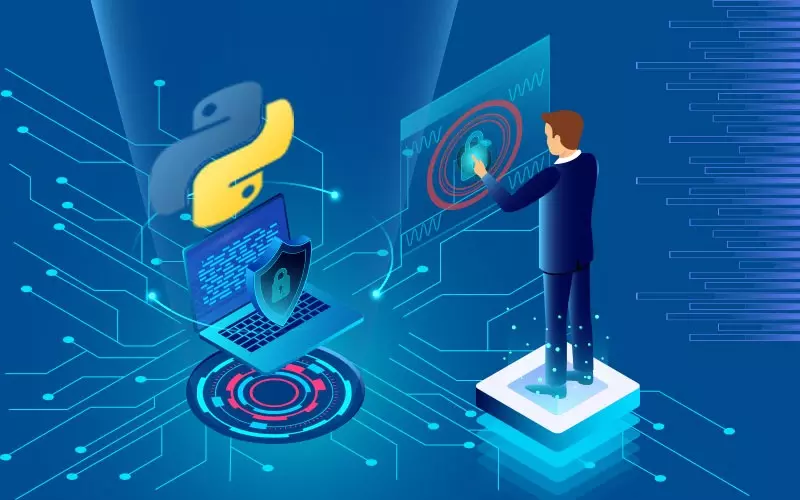Python for Blockchain: Exploring Cryptocurrency Development in 2023
Blockchain technology has revolutionized the world of finance and digital transactions. With the rise of cryptocurrencies, such as Bitcoin and Ethereum, the demand for blockchain developers has soared. If you’re interested in diving into the exciting world of cryptocurrency development in 2023, Python is a programming language you should consider. In this article, we will explore the significance of Python in blockchain development and how it can empower you to create innovative solutions in the cryptocurrency space.
Introduction to Python and Blockchain
Blockchain is a distributed ledger technology that enables secure and transparent transactions. Python, a powerful and versatile programming language, has gained popularity among developers due to its simplicity, readability, and extensive libraries. Python’s ease of use makes it an excellent choice for beginners entering the blockchain space.
Advantages of Python in Blockchain Development
Python offers several advantages for blockchain development:
- Simplicity and Readability: Python’s clean syntax and readability make it easy to write and understand blockchain code, reducing the potential for errors and improving development efficiency.
- Rapid Prototyping: Python’s vast array of libraries and frameworks, such as Flask and Django, allow developers to build prototypes quickly and iterate on their blockchain projects.
- Large Developer Community: Python has a thriving developer community that provides extensive support, resources, and documentation for blockchain development, making it easier for beginners to learn and grow.
- Interoperability: Python’s interoperability allows seamless integration with other programming languages and platforms, enabling developers to leverage existing solutions and collaborate effectively.
Setting Up the Development Environment
To start developing blockchain applications with Python, you need to set up your development environment.
- Install Python: Download and install the latest version of Python from the official Python website.
- Install Virtual Environment: Set up a virtual environment to isolate your Python project dependencies.
- Choose an Integrated Development Environment (IDE): Popular choices include PyCharm, Visual Studio Code, and Jupyter Notebook. Select the one that best suits your preferences.
- Install Blockchain Libraries: Install essential blockchain libraries like Web3.py, which provides an interface to interact with Ethereum-based smart contracts.
Creating Smart Contracts with Python
Smart contracts are self-executing contracts with predefined rules encoded on the blockchain. Python enables developers to create smart contracts using frameworks like Solidity and Vyper. Here’s a step-by-step guide to creating smart contracts with Python:
- Define the Contract Structure: Write the contract code defining its functions, variables, and event handlers.
- Compile the Contract: Use the Solidity or Vyper compiler to convert your contract code into bytecode.
- Deploy the Contract: Deploy the compiled contract onto the blockchain network using Web3.py or other similar libraries.
- Interact with the Contract: Utilize Python’s web3.py library to interact with deployed smart contracts, including calling functions, retrieving data, and handling events.
Interacting with Blockchain Networks
Python provides powerful tools for interacting with various blockchain networks. Web3.py, an Ethereum library, allows developers to interact with Ethereum-based networks and perform actions like sending transactions, querying blockchain data, and listening to events. For other blockchain platforms, libraries like pycoind for Bitcoin or Stellar-sdk for Stellar offer similar capabilities.
Security Considerations in Cryptocurrency Development
When developing cryptocurrency solutions, security is paramount. Here are some essential security considerations:
- Secure Key Storage: Safely store private keys and sensitive information using hardware wallets or secure key management systems.
- Code Auditing: Perform regular code audits to identify and fix vulnerabilities in your smart contracts and applications.
- Secure Communication: Implement secure communication protocols, such as HTTPS, to protect user data and prevent unauthorized access.
- Consensus Algorithm Selection: Understand the security implications of different consensus algorithms and choose the one that aligns with your project’s requirements.
Scalability and Performance Optimization
Scalability is a crucial aspect of blockchain development. Python provides various techniques to optimize the performance of your cryptocurrency applications:
- Code Optimization: Optimize your Python code by reducing redundant operations, improving algorithms, and utilizing caching techniques.
- Database Optimization: Implement efficient database designs and indexing strategies to enhance data retrieval and storage efficiency.
- Parallel Processing: Leverage Python’s multiprocessing or threading libraries to parallelize computationally intensive tasks and improve overall performance.
- Microservices Architecture: Design your application using a microservices architecture to distribute the workload across multiple services, enhancing scalability and fault tolerance.
Python Libraries and Frameworks for Blockchain
Python offers numerous libraries and frameworks that simplify blockchain development.
- Web3.py: A Python library for interacting with Ethereum-based blockchain networks.
- PyEthereum: A Python implementation of the Ethereum protocol, enabling developers to build Ethereum-compatible networks.
- Hyperledger Fabric SDK for Python: A library for developing blockchain solutions using the Hyperledger Fabric framework.
- Bitcoin: Various Python libraries like
pycoindandpython-bitcoinlibfacilitate Bitcoin blockchain development.
Future Trends and Opportunities
The future of Python in blockchain development is promising. As cryptocurrencies gain wider acceptance and blockchain technology continues to evolve, Python’s versatility and extensive developer community will play a vital role in shaping the industry. Embracing Python for blockchain development opens up exciting opportunities for creating innovative decentralized applications, exploring new consensus mechanisms, and building scalable and secure financial solutions.
Conclusion
Python has emerged as a popular programming language for blockchain development. Its simplicity, readability, and extensive libraries make it an excellent choice for building cryptocurrency solutions. By harnessing Python’s power, you can delve into the fascinating world of blockchain technology, create your own cryptocurrencies, and contribute to the decentralized revolution.
FAQs
1. Can I use Python for cryptocurrency mining?
While Python is not the most efficient language for cryptocurrency mining due to its interpreted nature, you can utilize Python libraries to interact with mining software and manage mining operations.
2. Are there any Python frameworks specifically designed for developing blockchain applications?
Yes, several Python frameworks cater to blockchain development, such as Web3.py, PyEthereum, and Hyperledger Fabric SDK for Python. These frameworks provide convenient abstractions and tools for building blockchain applications.
3. Is Python the only programming language used in blockchain development?
No, blockchain development involves various programming languages. However, Python’s simplicity and extensive libraries make it a popular choice among developers, especially for prototyping and rapid development.
4. Can I create my own cryptocurrency using Python?
Yes, Python enables you to create your own cryptocurrencies. By leveraging existing libraries like "coin curve" and “pycryptodome", you can build the underlying blockchain infrastructure and develop the necessary smart contracts.
5. What are the career opportunities in Python blockchain development?
Python blockchain developers are in high demand. With the increasing adoption of blockchain technology, there are ample opportunities to work on exciting projects, contribute to decentralized finance (DeFi) platforms, and explore the world of non-fungible tokens (NFTs).




